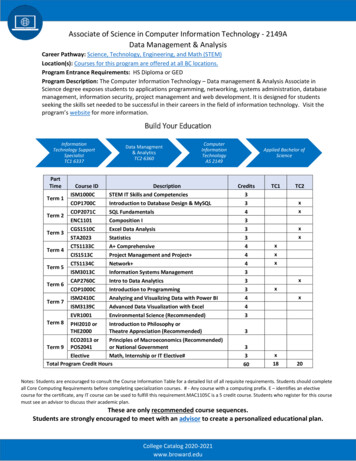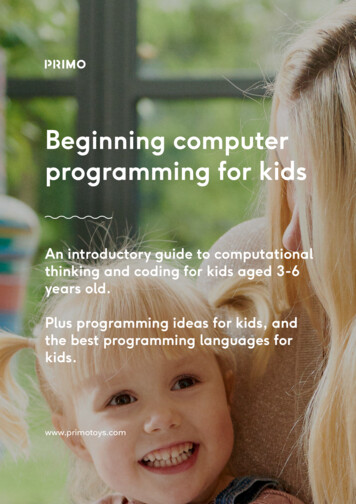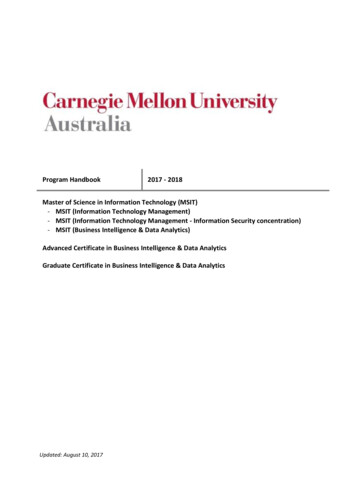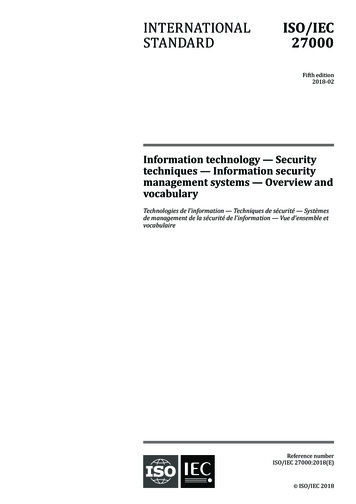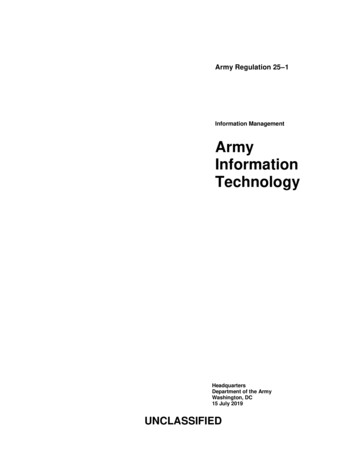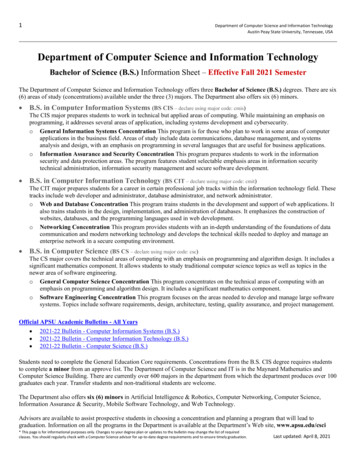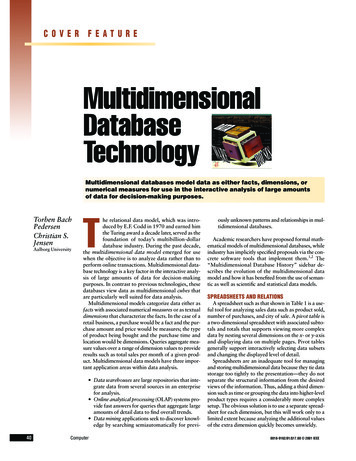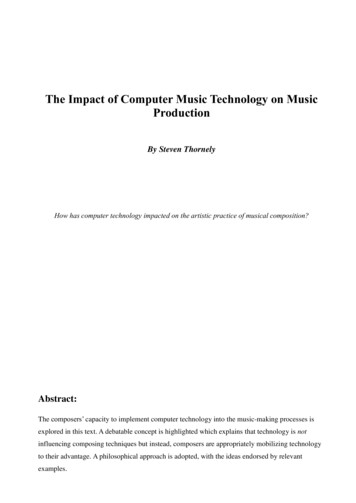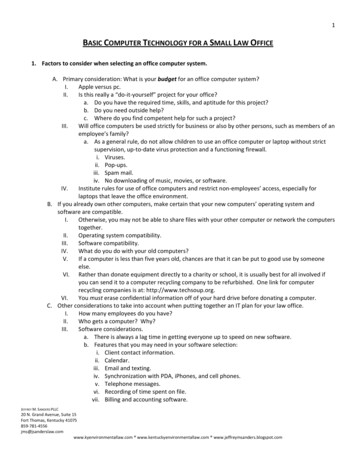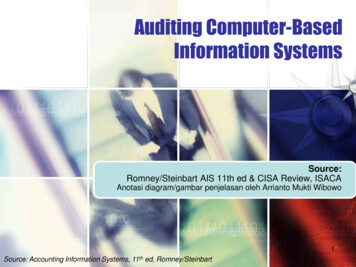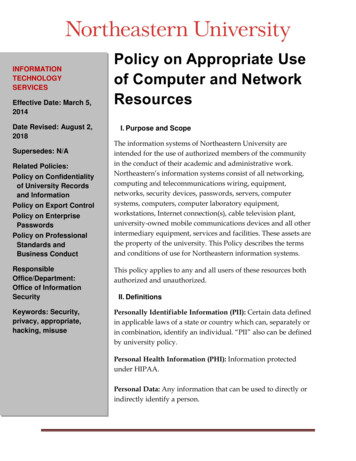
Transcription
INFORMATIONTECHNOLOGYSERVICESEffective Date: March 5,2014Date Revised: August 2,2018Supersedes: N/ARelated Policies:Policy on Confidentialityof University Recordsand InformationPolicy on Export ControlPolicy on EnterprisePasswordsPolicy on ProfessionalStandards andBusiness ConductPolicy on Appropriate Useof Computer and NetworkResourcesI. Purpose and ScopeThe information systems of Northeastern University areintended for the use of authorized members of the communityin the conduct of their academic and administrative work.Northeastern’s information systems consist of all networking,computing and telecommunications wiring, equipment,networks, security devices, passwords, servers, computersystems, computers, computer laboratory equipment,workstations, Internet connection(s), cable television plant,university-owned mobile communications devices and all otherintermediary equipment, services and facilities. These assets arethe property of the university. This Policy describes the termsand conditions of use for Northeastern information systems.ResponsibleOffice/Department:Office of InformationSecurityThis policy applies to any and all users of these resources bothauthorized and unauthorized.Keywords: Security,privacy, appropriate,hacking, misusePersonally Identifiable Information (PII): Certain data definedin applicable laws of a state or country which can, separately orin combination, identify an individual. “PII” also can be definedby university policy.II. DefinitionsPersonal Health Information (PHI): Information protectedunder HIPAA.Personal Data: Any information that can be used to directly orindirectly identify a person.
Sensitive Personal Data: Special categories of Personal Data including racial and ethnicorigin, religion, sexual orientation, etc. that is subject to more stringent protection undersome laws and regulations.Health Insurance Portability and Accountability Act (HIPAA): Federal law protectingand defining the appropriate use of PHI and medical records. For purposes of thisPolicy, “HIPAA” includes the HITECH Act amendments to HIPAA.Virtual Private Network (VPN): Technology used for secure communication from aremote location to a network resource.Multi-factor Authentication (MFA): A method of confirming a user's claimed identityby utilizing a combination of two or more pieces of evidence, usually something theyknow (e.g. a pin or password) in combination with something they have (e.g. afingerprint or smartphone app).RESNet: The residential student network of Northeastern University.NUNet: The administrative network of Northeastern University.NUWave: The Wireless network of Northeastern University.III.PolicyUser Rights and Responsibilities Sections – GENERALPart 1Assent to Terms of the Appropriate Use PolicyBy accessing and/or using university information systems, and/or by “clickingthrough” a usage agreement during sign-on to any university system, registrationonto ResNet or any other equipment registration procedure, users assent to theTerms and Conditions of this Appropriate Use Policy.Part 2Access To and Use of Systems/Normal Duration of ServiceAccess to and use of Northeastern information systems are privileges granted by theuniversity to faculty, staff, students and authorized third parties. Additionalelectronic experiences as may be offered to parents and extended populations areincluded under the provisions of this paragraph. Access for up to one (1) academic orcalendar year for others, including "sponsored" individuals whose relationship withPolicy on Appropriate Use of Computer and Network ResourcesAugust 2, 2018Page 2
Northeastern is a result of a university-recognized affiliation or relationship must beapproved by the authorizing unit. The sponsoring department, lab or business officeis solely responsible for transactions conducted using the credentials assigned toindividuals whom they sponsor. The sponsoring department, lab or business officeshall terminate the sponsored account(s) when an individual they have sponsoredleaves their supervision, is no longer qualified by role/responsibility or no longer hasa legitimate need to access Northeastern systems and data. The university retains solediscretion over the extent to which access privileges are granted, extended and/orrevoked.Part 3Use of Computer Accounts and FacilitiesMembers of the Northeastern community may use only the computer accounts andfacilities authorized by the university for their use. Use of another person's account,identity, security devices/tokens, or presentment of false or misleading informationor credentials, or unauthorized use of information systems/services is prohibited.Part 4Users Responsible for Actions Conducted Under their User ID(s)Users are responsible for all use of information systems conducted under their userID(s), and are expected to take all precautions including password security and fileprotection measures to prevent use of their accounts and files by unauthorizedpersons/entities. Sharing of passwords or other access tokens with others isprohibited.Part 5Duties When Speaking in Electronic CommunicationsSpeakers are expected to make clear when they are not representing the university intheir electronic communications.Part 6Posting of Personal Information/Web Pages/Other Electronic WritingsUsers are responsible for the timeliness, accuracy and content/consequences of theirpersonal information, web pages and other electronic writings. Personal informationPolicy on Appropriate Use of Computer and Network ResourcesAugust 2, 2018Page 3
of members of the Northeastern community, including but not limited to students,faculty and staff, may not be posted or maintained on public networks or sites,unless the user fully complies with applicable laws, regulations , and universitypolicies governing handling of personal information.Part 7Use of University-Recognized Messaging SystemsElectronic messages pertaining to the official business of the university, including allacademic and administrative matters shall be sent from university-owned oruniversity-recognized messaging systems. For example, inquiries about studentsmust be sent from an account associated with a university-recognized e-mail system.Replies from faculty or staff must be sent using the same university-recognizedaccounts. If unrecognized third-party messaging systems are used to originate amessage, and/or if a party forwards messages from a university-owned oruniversity-recognized system to a third-party unrecognized system, the individualsusing these systems shall be solely responsible for all consequences arising fromsuch use.Part 8Use of University Systems to Host Non-University ActivitiesUse of university information systems for hosting non-university activities must havethe explicit written authorization of the Office of the Provost or its designee.Part 9Commercial UseUniversity information systems may not be used for commercial purposes exceptonly as permitted with the explicit prior written approval of the Offices of theProvost and General Counsel.Part 10Offering, Providing, Lending or Renting Access to University SystemsUsers may not offer, provide, lend, rent or sell access to university informationsystems or networks. Users may not provide access to individuals outside theuniversity community. Expansion or redistribution of Northeastern's cabletelevision services is not permitted. Expansion of centrally-managed administrativenetwork segments and connection of personal, private or departmental switches,Policy on Appropriate Use of Computer and Network ResourcesAugust 2, 2018Page 4
routers, wireless access points or DHCP-serving devices is prohibited, except asmay be agreed to in writing between the device owner and the university's Office ofInformation Security.Connection of personal or privately-owned routers and/or wireless access points tothe ResNet wired networks is prohibited.Northeastern reserves the right to reconfigure or disable the network port(s) of anyuser whose activity interferes with NUNet, ResNet, NUwave or any otheruniversity-provided system or service, for example, to address a misconfigureddevice or a computer infected with virus/malware.For security reasons, dial-up modems shall not be used on computers while theyare connected to the university network. The VPN (Virtual Private Network) shallinstead be used.Part 11Compliance with Internet Service Providers' Acceptable Use PoliciesInternet use must comply with the Acceptable Use Policy stipulated by our Internetservice nternetaupPolicy on Appropriate Use of Computer and Network ResourcesAugust 2, 2018Page 5
San ed AUP Eng.pdfPart 12Use of Remote ResourcesUsers may not connect to remote resources such as printer, file systems, or any otherremote resource, regardless of location on or off the Northeastern network, unless theadministrator of the remote resource has first granted permission to do so.Faculty and staff must use the Virtual Private Network (VPN) for remote access to theuniversity's electronic resources. The university reserves and intends to exercise itsright to determine: who may use the VPN, from what locations the VPN may be accessed, what services and experiences are offered through the VPN, the extent of individual access rights when using the VPN, to limit or block connections not originating from the VPN, and to assess and approve other secure connection methods.Exceptions to this policy provision may be made for vendors and affiliates whomaintain private connections to the university network.All users establishing a connection to the university network through the VPN arerequired to use multi-factor authentication (MFA). Users connecting to the networkthrough VPN or by any other means are responsible to ensure antivirus software isPolicy on Appropriate Use of Computer and Network ResourcesAugust 2, 2018Page 6
present on their computer, and that its protection signatures are up to date. Formore information on use of the VPN, MFA, or antivirus software, please refer to theInformation Services website.Part 13Irresponsible/Wasteful UseUsers may not use information systems irresponsibly, wastefully, or in a manner thatadversely affects the work or equipment of others at Northeastern or on the Internet.Part 14Specific Prohibitions on Use of Information SystemsIn addition to all of the requirements of this Policy, it is specifically prohibited to useNortheastern University information systems to: Harass, threaten, defame, slander or intimidate any individual or group; Generate and/or spread intolerant or hateful material, which in the sole judgment of theuniversity is directed against any individual or group, based on race, color, religious creed,genetic information, sex, gender identity, sexual orientation, age, national origin, ancestry,marital status, veteran or disability status; Transmit or make accessible material, which in the sole judgment of the university isoffensive, violent, pornographic, annoying or harassing, including use of Northeasterninformation systems to access and/or distribute obscene or sexually explicit materialunrelated to university sanctioned work or bona fide scholarship; Generate unsolicited electronic mail such as chain messages, unsolicited job applications,commercial announcements, or other communications inconsistent with or in violation ofuniversity policy; Generate falsely -identified messages or content, including use of forged content of anydescription; Transmit or make accessible password information; Attempt to access and/or access information systems and/or resources for which authorityhas not been explicitly granted by the system owner(s); Capture, decipher or record user IDs, passwords, or keystrokes; Manipulate or tamper with uniform resource locators (URLs);Policy on Appropriate Use of Computer and Network ResourcesAugust 2, 2018Page 7
Intercept electronic communications of any kind; Probe by any means the security mechanisms of any resource on the Northeastern network,or on any other network through a connection to the Northeastern network; Disclose or publish by any means the means to defeat or disable the security mechanisms ofany component of a Northeastern University Information System or network; Alter, degrade, damage or destroy data without authorization; Knowingly transmit computer viruses or malicious/destructive code of any description; Conduct illegal, deceptive or fraudulent activity; Obtain, use or retransmit copyrighted information without permission of the copyrightholder; Place bets, wagers or operate games of chance; Use university resources for financial gain. This includes, but is not limited, to bitcoinmining; or Tax, overload, impede, interfere with, damage or degrade the normal functionality,performance or integrity of any device, service or function of Northeastern informationsystems, content, components, or the resources of any other electronic system, network,service or property of another party, corporation, institution or organization.The above enumeration is not all-inclusive. If there is a question as to whether aspecific use is appropriate or acceptable under this policy, users are responsible forobtaining clarification from the Office of Information Security and the university'ssole determination shall prevail.UNIVERSITY RIGHTS AND RESPONSIBILITIES SECTIONSPart 15General Rights of the UniversityTo protect Northeastern information systems against unauthorized or improper use,and to protect authorized users from the effects of unauthorized or improper usage,the university has the right with or without notice, to monitor, record, limit or restrictPolicy on Appropriate Use of Computer and Network ResourcesAugust 2, 2018Page 8
any user account, access and/or usage of account. The university may also monitor,record, inspect, copy, remove or otherwise alter any data, file, or system resources inits sole discretion. The university further has the right to periodically inspect systemsand take any other actions necessary to protect its information systems. The universityalso has access rights to all files and electronic mail on its information systems.Anyone using these systems expressly consents to such oversight.Part 16Right to Seize/Inspect University-Owned Computing DevicesThe university reserves the right at any time, with or without prior notice orpermission from the user or users of a computer or other university-ownedcomputing device, to seize such device and/or copy or have copied, any and allinformation from the data storage mechanisms of such device as may be required inthe sole discretion of the university in connection with investigations of possiblewrongdoing or legal action. In addition to the foregoing, privately owned devicesconnected to the university network are also subject to inspection by authorizeduniversity personnel.Part 17Right to Block ContentThe university reserves the right to reject from the network or block electroniccommunications and content deemed not to be in compliance with this or otherpolicies governing use of university information systems.Part 18Right to Disclosure InformationThe university may disclose information, including pursuant to an internal or externalinvestigation of alleged misconduct or wrongdoing, and may provide information tothird parties, including law enforcement. By accessing Northeastern informationsystems, users give Northeastern permission to conduct each of the operationsdescribed above.Part 19Detection of Plagiarism/Academic DishonestyPolicy on Appropriate Use of Computer and Network ResourcesAugust 2, 2018Page 9
The university reserves the right to use, and intends to use manual and/or automatedmeans to assess materials submitted as academic work for indications of plagiarismor other form(s) of academic dishonesty.Part 20Actions to be Taken When a Policy Violation is IdentifiedWhen a potential violation is identified, the appropriate system manager or unit head,the Office of Information Security, and any other university employees or agents asare deemed appropriate, are authorized to investigate and initiate action inaccordance with university policy. Repeated violations may result in suspension ortermination of service(s). In addition, the university may require restitution for anyuse of information systems that violates this policy. The university may also provideevidence of possible illegal or criminal activity to law enforcement authorities.Part 21Consequences of Policy ViolationAny unauthorized, inappropriate, illegal or illegitimate use of the university'sinformation systems, or failure to comply with this policy shall constitute a violationof university policy and will subject the violator to disciplinary action by theuniversity up to and including separation of employment or relationship, and mayresult in legal action.Part 22Termination of Access to University Systems and ServicesNotwithstanding any other provision of this policy, authorization to access theinformation systems and resources of Northeastern University ends at the terminationof employment, end of a recognized role or relationship, or loss of sponsorship.CONFIDENTIALITY / PRIVACY SECTIONSPart 23Electronic Content Property of the UniversityPolicy on Appropriate Use of Computer and Network ResourcesAugust 2, 2018Page 10
Right of University to Monitor ContentUniversity information systems and the messages, e-mail, files, attachments,graphics, official university social media accounts and Internet traffic generatedthrough or within these systems are the property of the university. They are not theprivate property of any university employee, faculty, staff, contractor, student orany other person. No user of university systems should have an expectation ofprivacy in their electronic communications. All electronic communications, filesand content presented to and/or passed on the Northeastern network, includingthose to, from or through Internet connection(s), may be monitored, examined,saved, read, transcribed, stored or re-transmitted by an authorized employee oragent of the university, in its sole discretion, with or without prior notice to theuser. The university reserves and intends to exercise the right to do so. Electroniccommunications and content may also be examined by automated means.Part 24Confidentiality of ContentThe confidentiality of any content shall not be assumed. Even when a message ormaterial is deleted, it may still be possible to retrieve and read the message ormaterial. Further, use of passwords for security does not guarantee confidentiality.Messages read in HTML may identify the reader to the sender. Aside from the rightof the university to retrieve and read any electronic communications or content,such messages or materials must be treated as confidential by other students oremployees and accessed only by the intended recipient. Without prior authorization,no person is permitted to retrieve or read electronic mail messages not sent to them.Part 25Responsibility to Maintain ConfidentialityNotwithstanding the university's right to audit or monitor its information systems,all users are require
Aug 02, 2018 · Health Insurance Portability and Accountability Act (HIPAA): Federal law protecting and defining the appropriate use of PHI and medical records. For purposes of this Policy, “HIPAA” includes the HITECH Act amendments to HIPAA. Virtual Private Network (VPN): Technology used for secure communication from a remote location to a network resource.
